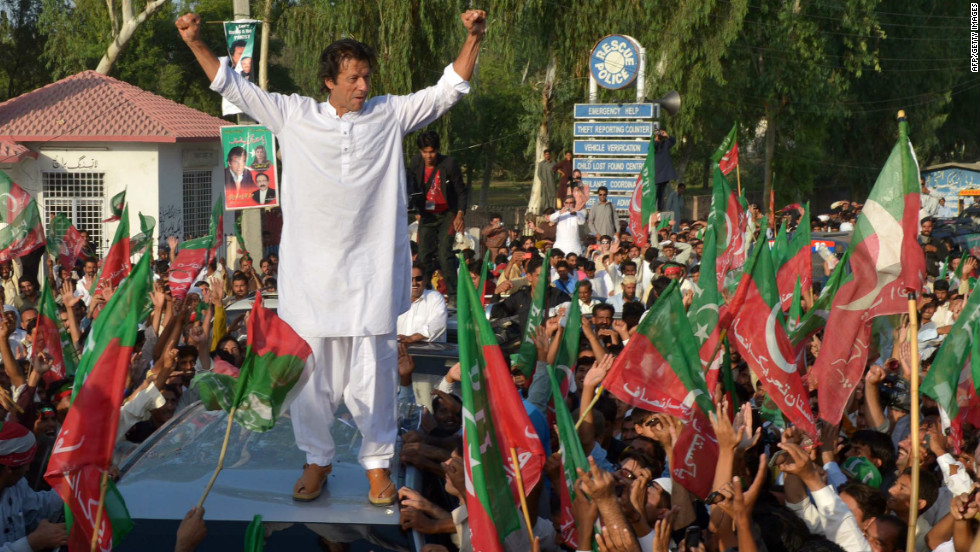Pakistan's New Day Dawning
"Pakistanis are hoping against hope that somebody is going to bring about changes."
"But I do think despite all the things Imran wants to do, there is a feeling that we may be in a scenario where much of the 'Naya' [new] Pakistan may be a bit like the old Pakistan -- more of the same."
Ayesha Jalal, Pakistani historian, professor of history, Tufts University, Mass.
"I don't know if he will be good for the country, but he adds to the confusion in the narrative."
"He is a polarizing force, like Modi and Trump."
"They do not discourage their followers from taking up divisive positions and abusing or attacking those who disagree with them."
Beena Sarwar, journalist, activist, teacher of journalism, Emerson College, Boston
"As a cricket hero, he united the country, but as a politician, he is very polarizing."
"He is a cult of personality and people are really attracted to him because of his charisma, but there are a lot of people in Pakistan who hate him. They think he has a soft spot for terror, are very much against some of his views towards women, so do not think he is very smart."
Michael Kugelman, analyst, Woodrow Wilson International Center for Scholars, Washington
 |
| Pakistan cricket star turned politician Imran Khan gestures as he stands on a vehicle during a rally in Mianwali, northern Pakistan, on October 6, 2012. |
The country is undergoing hard economic times, in contrast to its neighbour India and that contrast is infuriating to Pakistan. The 207 million people of Pakistan, once part of India, expect their country to expand its middle class demographic, but its economic straits mitigate against that anytime soon. Corruption and elitism, a military and a secret service infiltrated by Islamists does not represent a formula for an encouraging future. Its newly-elected prime minister, 65-year-old Imran Khan's reputation and campaign promises brought his Tehreek-e-Insaaf party to power.
And he is promising to solve a problem of a hugely indebted country whose economy of $300 billion has faltered thanks to corrupt political regimes where basic necessities are unavailable to its citizens. The economy is in such dire straits it must look to a financial saviour and China is happy to oblige, building a China-Pakistan Economic Corridor cutting the length of Pakistan to connect China to the Indian Ocean, the $62-billion investment reflecting part of China's massive Belt and Road Initiative, in the process indebting Pakistan to China, impacting the former's sovereignty.
In view of the parlous state of affairs, Mr. Khan plans to live modestly, with his third wife, an Islamist who is also a practitioner of the occult. Mr. Khan speaks piously of the need for equality between men and women, but he has himself become fundamentally Islamist, shedding his secular celebrity persona in favour of deep devotion to Islam, favouring the burqa his ultra-religious wife affects. They plan to have two servants and live in a three-bedroom house, eschewing the palatial estate reserved for head of state, in view of an austerity drive facing up to the country's economic crisis.
Of course, the country has a moral, human rights crisis as well, in that it views conversion from Islam to Christianity a capital offence as is any opinion expressed critical of Islam. There are Christians on death row awaiting their final punishment resulting from their having been charged and found guilty of blasphemy in a justice system utterly intolerant of deviance of Sharia law in an Islamist nation that under its new prime minister is expected to become ever more unforgivingly fundamental in its religious devotion.
He muses that a prospect for transforming the prime minister's residence to a university might be useful. The 524 household staff will be let go. The fleet of 80 vehicles, 33 of which are bulletproof will be sold, two only to be maintained for his use. "I want to tell my people, I will live a simple life, I will save your money", he said. He plans to call on the wealthy to begin paying taxes. And Pakistanis living abroad should return their money to domestic banks to help the country overcome its foreign currency crisis.
Opposition parties feel disappointed that the new prime minister made no mention in his 70-minute speech to the public of how growing extremism will be dealt with. That Khan himself has been accused of emboldening those extremists through invoking his own hard-line issues on blasphemy on the campaign trail, strikes some as boding ill on that file. A bailout of $12-billion is urgent, reflecting the debt crisis. Yet Khan contemplating the country's spiral of debt balks at borrowing to pay the interest on earlier loans.
He would prefer rather than begging internationally for money for Pakistani expatriates to send their money back home: "I want you to bring your money to Pakistan. To keep your money in Pakistani banks. Right now we are short on dollars. There is a huge trade gap right now", he stated. Among his promises -- solving poverty and malnutrition, and eradicating some of the world's highest maternal and infant mortality rates. Much less the need to educate the 22.8 million Pakistani children who don't attend school.
 |
| Social media exploded with jokes and memes when Pakistan Tehreek-e-Insaf (PTI) and former cricketer Imran Khan on Sunday announced his third marriage with Bushra Maneka, who was his spiritual adviser. |
Labels: Economy, Imran Khan, Islamism, Pakistan, Prime Minister

<< Home